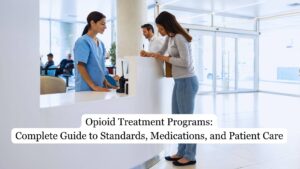Medication-Assisted Treatment (MAT) is a highly effective approach to addressing substance use disorders. It combines FDA-approved medicines with counseling and behavioral therapies to create a comprehensive medication plan. It works to ease withdrawal challenges, reduce cravings, stabilize overall health, and improve retention in treatment programs.
This article highlights the many benefits of MAT and explains why it plays such a vital role in supporting individuals on the path to recovery.
Reduces Withdrawal Discomfort
Withdrawal is often one of the most difficult obstacles for people attempting to stop using substances. Physical symptoms can include nausea, sweating, insomnia, and intense restlessness, while emotional strain can add anxiety and depression. MAT helps by using carefully monitored medicines to ease these effects, making the transition to sobriety less overwhelming.
This reduction in discomfort allows people to focus more fully on therapy and personal growth. With manageable withdrawal symptoms, individuals are far more likely to stay committed to their recovery process.
Decreases Risk of Relapse
Relapse is a common concern for individuals in early recovery. Cravings can be powerful and difficult to control without support. MAT addresses this by stabilizing brain function, which reduces the intensity of cravings and helps individuals resist returning to substance use.
Lowering the risk of relapse strengthens the foundation for long-term recovery. With this stability, people can direct their energy toward rebuilding routines and focusing on therapy, work, and family connections.
Supports Mental and Emotional Stability
Addiction often disrupts more than just physical health. It can cause significant mental and emotional strain. Constant cravings, fear of relapse, and stress from withdrawal create instability that makes recovery harder. MAT helps regulate mood and restore balance, reducing the overwhelming pressure of early recovery.
This emotional stability allows individuals to actively engage in counseling and address the root causes of addiction. Improved mental health helps rebuild confidence and increases resilience in managing challenges.
Improves Retention in Treatment Programs
Successful recovery depends on consistent involvement in treatment. Without adequate support, many individuals leave programs too soon, making relapse more likely. MAT has been shown to improve retention by making recovery more manageable and less daunting.
When symptoms are controlled, people are more willing to attend counseling, support groups, and follow-up appointments. This consistent participation provides individuals with a structured path forward, giving them greater opportunities to achieve long-term success.
Encourages Healthier Lifestyle Changes
Beyond reducing symptoms, MAT provides individuals with the stability needed to make lasting lifestyle improvements. Freed from the constant cycle of cravings and withdrawal, people can begin focusing on areas that support their overall well-being. This includes rebuilding relationships, re-entering the workforce, or pursuing education.
Many also focus on physical health by improving nutrition and exercise habits. With a solid foundation in place, individuals are able to create meaningful, lasting changes that extend beyond sobriety alone.

Reduces Risk of Overdose
For individuals struggling with opioid use disorder, relapse after a period of abstinence carries heightened risk. Tolerance often decreases quickly, making even small amounts dangerous and potentially fatal. MAT helps by maintaining stability, reducing cravings, and lowering the likelihood of high-risk use.
The protective nature of this approach has been shown to significantly decrease rates of overdose and save lives. This safety benefit underscores why it is considered an essential component of modern addiction care.
Integrates Medical and Behavioral Care
Medicines alone do not resolve the root causes of addiction, which are often tied to mental health challenges, trauma, or environmental pressures. Pairing regulated treatment with counseling provides a more holistic approach. This combination ensures individuals receive tools to manage both the biological and psychological aspects of addiction, giving them a well-rounded recovery experience.
Behavioral care addresses underlying issues such as anxiety, depression, or trauma that often coexist with substance use disorders, improving coping skills and resilience. Coordinated care in MAT also reduces stigma by offering comprehensive services within a single, streamlined program, which increases accessibility and encourages sustained engagement.
Final Thoughts From Raise the Bottom
Medication-Assisted Treatment offers a reliable and evidence-based path for overcoming substance use disorders. Easing withdrawal, reducing relapse risk, supporting emotional stability, and improving program retention, it provides individuals with the support necessary to build lasting recovery. The integration of medical and therapeutic care makes MAT a cornerstone of effective medication.
At Raise the Bottom, we recognize the complex nature of addiction and the importance of addressing both physical and emotional needs. We offer compassionate, structured care, including MAT, to help individuals take meaningful steps toward renewed stability and health.






